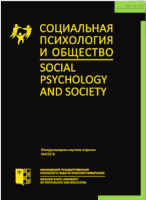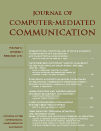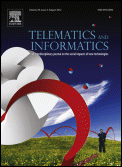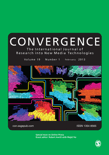
Cyberpsychology-Journal of Psychosocial Research on Cyberspace
Scope & Guideline
Exploring the Digital Mindscape
Introduction
Aims and Scopes
- Understanding Cyberpsychology:
The journal focuses on the psychological aspects of online behavior, including how individuals interact with digital platforms and the implications for mental health. - Social Media and Mental Health:
It investigates the relationship between social media use and various mental health outcomes, exploring both positive and negative effects on well-being. - Cyberbullying and Online Aggression:
The journal addresses issues related to cyberbullying, including the dynamics of aggression, victimization, and the role of bystanders in online environments. - Gaming and Addiction:
Research on gaming behaviors, including the prevalence of gaming disorders and the psychological factors that contribute to excessive gaming, is a significant focus. - Technology's Role in Communication:
The journal examines how technology alters interpersonal communication, including the effects of digital interactions on social relationships and emotional expression. - Impact of Digital Influencers and Online Communities:
Investigating the influence of digital communities and online personalities on behaviors, attitudes, and social norms. - Technological Interventions in Mental Health:
The journal explores the use of technology in mental health services, such as teletherapy and AI-driven mental health applications.
Trending and Emerging
- Impact of COVID-19 on Online Behavior:
A notable increase in research examining changes in online behavior and mental health during and post-pandemic, reflecting the significant role of technology in coping strategies. - Mental Health Influencers and Online Communities:
Growing interest in how health influencers on social media affect followers' behaviors and attitudes towards mental health and lifestyle choices. - Cyber Victimization and Resilience:
Increased focus on the psychological effects of cyber victimization, including the resilience factors that help individuals cope with online aggression. - Artificial Intelligence in Mental Health:
Emerging research examines the role of AI in mental health services, including perspectives from professionals on its effectiveness and ethical considerations. - Digital Stress and Well-Being:
A trend towards understanding the nuances of digital stress, including its impact on socioemotional well-being among various demographic groups. - Gamification and Engagement in Learning:
Research on the use of gamification in educational contexts is on the rise, exploring how gaming elements can enhance engagement and learning outcomes. - Social Comparison and Body Image:
Increasing attention to the effects of social media on body image, particularly among adolescents, and the role of media literacy in mitigating negative outcomes.
Declining or Waning
- Traditional Media Effects:
Research focusing on traditional media's psychological effects has diminished, indicating a shift towards examining newer platforms like social media and streaming services. - General Internet Use Studies:
Broad studies analyzing internet use without specific contexts or behaviors are becoming less common, as research increasingly targets specific applications and their impacts. - Static Models of Online Behavior:
There has been a decline in studies that utilize static models to analyze online behavior, with a move towards dynamic and longitudinal approaches that account for changes over time. - Focus on Older Adults' Internet Use:
Research specifically addressing older adults' interactions with technology has decreased, likely due to a broader focus on youth and emerging adult populations. - Cybersecurity Awareness as a Primary Focus:
While cybersecurity remains important, papers exclusively examining awareness without a psychological perspective have become less frequent, as the journal emphasizes the psychological implications of online security.
Similar Journals

Social Psychology and Society
Advancing Knowledge on Social Dynamics and BehaviorSocial Psychology and Society, published by Moscow State University Psychology & Education, stands at the confluence of psychology and societal studies, offering a critical platform for discourse in the realms of Applied Psychology and Social Psychology. Since its launch, this Open Access journal, indexed in Scopus and recognized for its inclusive approach, has been dedicated to fostering engaging and interdisciplinary research that explores the nuances of social behaviors and societal influences. With a commitment to disseminate knowledge freely since 2015, the journal ensures that researchers, students, and professionals across the globe have access to high-quality studies, thus promoting a broader understanding of the psychological factors shaping societal dynamics. Although currently positioned in Quartile 4 in both Applied Psychology and Social Psychology, and Quartile 3 in the wider Social Sciences, its impact is steadily rising, reflected in its strategic rankings, and it continues to seek innovative contributions that enhance empirical and theoretical frameworks within the field. Our objective is to cultivate a scholarly community that critically engages with contemporary issues, promotes psychological well-being, and contributes to meaningful societal change.

AGGRESSION AND VIOLENT BEHAVIOR
Bridging Disciplines in the Study of ViolenceAGGRESSION AND VIOLENT BEHAVIOR is a premier academic journal published by Pergamon-Elsevier Science Ltd, specializing in the intricate study of aggressive and violent behavior across various contexts. Since its inception in 1996, the journal has rapidly established itself within the field, currently ranked in the Q1 quartile in Clinical Psychology and Pathology and Forensic Medicine, and in Q2 in Psychiatry and Mental Health, in 2023. This distinction reflects its commitment to advancing research through high-quality, impactful scholarship, with Scopus rankings highlighting its significance—placing #36 out of 311 in Clinical Psychology and #28 out of 208 in Pathology and Forensic Medicine. With a vision to foster interdisciplinary discourse and research, AGGRESSION AND VIOLENT BEHAVIOR caters to a diverse academic community of researchers, professionals, and students interested in the psychological, sociological, and clinical dimensions of violence and aggression. While the journal is not open access, it remains a valuable resource for those dedicated to understanding and addressing the complexities of human behavior.

Internet Research
Exploring the Digital Frontier of Human InteractionInternet Research, published by Emerald Group Publishing Ltd, stands as a pivotal peer-reviewed journal in the domains of communication, economics, and sociology. Established in 1991, it has continually advanced the understanding of how the internet influences human interaction, economic behaviors, and sociopolitical structures. With impressive ranking achievements, including Q1 status in Communication, Economics and Econometrics, and Sociology and Political Science, the journal is recognized for its high impact, evidenced by its outstanding Scopus rankings—28th in Sociology and Political Science and 12th in Communication, highlighting its relevance and quality within the academic community. While the journal is not open access, its selective publication of landmark research attracts a dedicated readership of scholars, professionals, and students eager to explore the multidimensional impacts of the digital age. With a focus on innovative methodologies and empirical findings, Internet Research aims to foster scholarly discourse that shapes our understanding of the evolving online landscape through 2024 and beyond.

Journal of Computer-Mediated Communication
Advancing Insights into Human Interaction in a Digital WorldThe Journal of Computer-Mediated Communication, published by Oxford University Press, stands as a premier platform for scholarly discourse in the fields of Communication, Computer Networks and Communications, and Computer Science Applications. Since its inception in 1995, this Open Access journal has provided invaluable insights into the evolving dynamics of human interaction through digital mediums. The journal has garnered an impressive reputation, evidenced by its Q1 ranking in multiple categories and a remarkable Scopus rank of #22 out of 511 in the Communication field, placing it in the 95th percentile. Covering diverse topics up to 2024, it is essential for researchers, professionals, and students alike seeking to explore the intersections of technology and communication. With its commitment to advancing knowledge and fostering academic engagement, the Journal of Computer-Mediated Communication is pivotal for anyone invested in understanding the profound impact of technology on social interaction.

Online Journal of Communication and Media Technologies
Bridging Theory and Practice in Modern Media LandscapesThe Online Journal of Communication and Media Technologies, published by Bastas Publications DOO in Cyprus, stands as a crucial platform for scholars and practitioners in the rapidly evolving fields of communication, media, and technology. With an ISSN of 1986-3497, this journal addresses a diverse range of topics at the intersection of these disciplines, making significant contributions to both theoretical frameworks and practical applications. As a recognized entity in the academic community, it boasts impressive rankings in Scopus, such as Q2 in Communication and Q2 in Media Technology, illustrating its impact and relevance. Researchers will appreciate its open access model, which facilitates knowledge dissemination and engagement among audiences. By fostering a collaborative environment for innovative ideas and research findings, the journal not only advances academic inquiry but also supports the professional development of its readership in navigating the complexities of modern media landscapes. Aiming to bridge the gap between theory and practice, the Online Journal of Communication and Media Technologies is an essential resource for those who wish to stay at the forefront of communication and media research from 2019 through 2024.

Behavioral Sciences
Unveiling the science behind human and ecological interactions.Behavioral Sciences is a prominent open-access journal published by MDPI, dedicated to advancing the interdisciplinary field of behavioral science. Established in 2011, the journal aims to disseminate high-quality research findings that explore the intricate connections between behavior, development, ecology, and neuroscience. With a commendable impact factor—ranking in the Q2 and Q3 categories across critical areas such as Development, Psychology, and Behavioral Neuroscience—the journal provides a platform for researchers and practitioners from diverse backgrounds to contribute groundbreaking studies. The accessible format ensures that valuable insights are available to a wide audience, promoting the application of behavioral science in various domains. Located in Basel, Switzerland, the journal is committed to fostering open dialogue and collaboration across disciplines, ultimately enhancing the understanding of complex behavioral phenomena.

TELEMATICS AND INFORMATICS
Empowering Researchers in the Evolving Landscape of InformaticsTELEMATICS AND INFORMATICS, published by Elsevier, is a leading journal that has significantly influenced the fields of communication, computer networks, electrical engineering, and law since its inception in 1984. With an impressive impact factor and a reputation that places it in the Q1 category across multiple disciplines, this journal serves as a crucial platform for researchers and practitioners who seek to explore the intersection of technology, information systems, and legal frameworks. The journal's commitment to disseminating cutting-edge research ensures that it remains at the forefront of academic discourse, appealing to a diverse audience including scholars, industry professionals, and students. Although currently not open access, TELEMATICS AND INFORMATICS offers comprehensive insights and innovative perspectives that contribute to the advancement of knowledge in its respective fields. For those engaged in the dynamic evolution of telecommunications and informatics, this journal is an indispensable resource, driving both theory and application.

Convergence-The International Journal of Research into New Media Technologies
Exploring the Frontiers of New Media InnovationConvergence - The International Journal of Research into New Media Technologies, published by SAGE Publications Inc., stands at the forefront of scholarly discourse in the dynamic field of new media technologies. With an impressive impact factor reflected in its prestigious Q1 quartile rankings in both Arts and Humanities (miscellaneous) and Communication categories, this journal serves as a vital resource for researchers, professionals, and students. Since its inception in 1995, Convergence has been dedicated to exploring the intersections of media, technology, and communication, offering original research, critical reviews, and theoretical discussions that illuminate the evolving digital landscape. With a commitment to high-quality scholarship, Convergence is positioned as a premier venue for pioneering studies that shape our understanding of media technologies and their cultural implications, making it an essential read for anyone eager to stay informed and engaged with contemporary media research.

Computers in Human Behavior Reports
Transforming understanding of human-machine interactions.Computers in Human Behavior Reports, published by ELSEVIER, is a distinguished open-access journal dedicated to advancing interdisciplinary research at the intersection of technology and human behavior. Since its inception in 2020, the journal has quickly gained a prominent position in the academic field, attaining Q1 category rankings in multiple areas including Applied Psychology, Artificial Intelligence, Cognitive Neuroscience, Human-Computer Interaction, and Neuroscience (miscellaneous). Its robust standing is evidenced by its exceptional Scopus ranks, particularly in Neuroscience—where it is positioned 4th out of 49 journals—demonstrating a high level of influence and engagement within the community. The journal's aim is to disseminate cutting-edge research findings and foster dialogue among researchers, professionals, and students alike, thereby addressing crucial questions regarding the impact of technology on human behavior and vice versa. As an open-access publication based in the United Kingdom, it not only enhances the visibility of research but also ensures wider accessibility to groundbreaking insights that shape our understanding of human-machine interactions.

International Journal of Online Marketing
Navigating the Complexities of Digital EngagementThe International Journal of Online Marketing, published by IGI Global, is a leading academic journal dedicated to advancing the field of digital marketing through rigorous research and innovative practices. With an ISSN of 2156-1753 and an E-ISSN of 2156-1745, this journal serves as a vital resource for researchers, professionals, and students interested in the rapidly evolving landscape of online marketing strategies, consumer behavior, and digital engagement. Although this journal does not currently offer open access options, it remains committed to providing high-quality and impactful articles that contribute to the academic discourse in marketing. Housed in Hershey, Pennsylvania, the journal plays an essential role in bridging the gap between theory and practice, encouraging contributions that reflect the latest trends and technologies in the digital marketing space. By disseminating valuable insights and empirical studies, the International Journal of Online Marketing aims to empower its audience to effectively navigate and leverage the complexities of online marketing in today's digital economy.